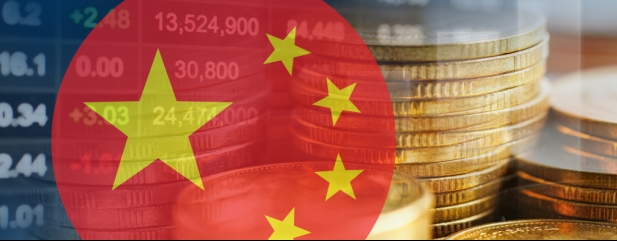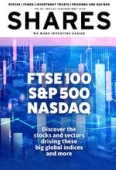Archived article
Please note that tax, investment, pension and ISA rules can change and the information and any views contained in this article may now be inaccurate.
Is China about to face its Minsky moment as country’s property crisis intensifies?

Upon finding James Bond crossing his path for a third time in quick succession, in Miami over cards, Kent for golf and then Geneva, Auric Goldfinger finally senses trouble and tells 007, ‘Mr Bond, they have a saying in Chicago: Once is happenstance. Twice is coincidence. The third time it is enemy action’.
Regardless of whether China sees its economic woes as self-inflicted or the efforts of third parties to undermine its prospects, there can be
no denying that its troubles are currently coming
in threes:
- Its largest residential property developer, Evergrande, is now filing for Chapter 15 bankruptcy protection in the USA, two years after it first missed scheduled interest payments on its huge foreign debt pile.
- Its second largest property developer, Country Garden, is now skipping coupon payments to its bondholders.
- Finance company Zhongrong, a so-called ‘trust’ specialist that invests savers’ pooled capital across China in a range of assets, has missed payments on maturing schemes to its product holders, be they corporations or wealthy individuals. The liquidity crunch here could in turn be the result of the Chinese residential property downturn as house prices fall, volumes dry up and property companies miss interest payment deadlines.
American and Western sanctions designed to restrict investment and the flow of intellectual property as well as certain products, such as cutting-edge silicon chips and semiconductor production equipment, could be seen by China as enemy action. But none of this can be coincidence and it suggests there may be further trouble ahead.

Minsky moment
China is doing its best to keep the plates spinning, cutting both interest rates and the amount of capital that banks have to hold (thus boosting their ability to lend) but some economists are arguing that the debt numbers mean China simply cannot grow at its current rate for too much longer. Some even argue that the country is facing its own Minsky Moment, as its economy reaches the third stage of the debt cycle outlined by economist Hyman Minsky in his 1993 paper The Financial Instability Hypothesis:
- Hedge finance, whereby a mix of cashflow and equity help borrowers to fund interest payments on debt and eventually pay off their liabilities.
- Speculative finance, where debtors have enough money to cover interest but cannot repay the original loan, which must be rolled over.
- Ponzi finance, where borrowers are unable to pay off the interest, let alone the principal debt and resort to asset sales to pay the bills.
Investors may think this sound a little apocalyptic, but it may help to explain why the Shanghai Composite index is going nowhere fast – and is no higher now than in was in early 2018, when stock market index constructors such as MSCI and FTSE Russell began to include onshore Chinese A-class shares, and not just Hong Kong-traded H shares, in their benchmarks.

The higher weighting given to Chinese equities raised the possibility that a wall of money from passive index trackers would flood into the market and push prices higher. It may have done at first, but not for long, and there is a danger that falling prices and falling weightings prompt a similar reflex, only this time to prompt a wave of passive selling.
Beyond the narrow confines of equity markets in Shanghai and Hong Kong, China’s property pickle begs many begs the question of what it means, if anything, for the global economy and, in turn, investment portfolios. Three immediate topics spring to mind.
China’s economy looks likely to slow and state support will surely be required to limit the damage from a housing bubble that is bursting, with fiscal support a distinct possibility.
China runs a trade surplus, so it sells more than it buys. In this respect, the damage to global trade flows may not be quite as big as perhaps feared
However, a slower Chinese building market could logically hit raw material demand and thus potentially commodity prices, while a squeeze on consumers could have ripples in the international travel and luxury goods markets, especially in Asia.
How the Communist Party manages to support economic growth without piling up too much
debt, or cutting interest rates to the point that the stock market becomes bubbly (as it did in 2007
and 2015) or the renminbi weakens (as it did in 2015-17 and 2019, leading to trade troubles with America) will be fascinating to watch. In the end if feels as if something will have to give – the currency or economic growth targets - especially if Minsky is right.
If there is any good news here, it may be that less demand for commodities and a weaker Chinese economy and currency take away some of the inflationary pressures that currently bedevil the West. Factory gate inflation in China, as measured by the producer price index, is already in negative territory, after all.


Important information:
These articles are provided by Shares magazine which is published by AJ Bell Media, a part of AJ Bell. Shares is not written by AJ Bell.
Shares is provided for your general information and use and is not a personal recommendation to invest. It is not intended to be relied upon by you in making or not making any investment decisions. The investments referred to in these articles will not be suitable for all investors. If in doubt please seek appropriate independent financial advice.
Investors acting on the information in these articles do so at their own risk and AJ Bell Media and its staff do not accept liability for losses suffered by investors as a result of their investment decisions.
Issue contents
Feature
Great Ideas
News
- Market faces up to ‘5% world’ ahead of Powell’s Jackson Hole appearance
- Why Intel’s blocked Israeli chip deal could pose threat to technology M&A
- Hotel groups Dalata and PPHE look to benefit from strong summer trading trends
- Strong domestic economy and improving balance sheet see Bank of Georgia shares surge
- VinFast zooms on to US market as investors pick holes in Tesla’s China strategy
- Barbenheimer can’t even save Everyman Media with the shares down 30% so far in 2023
- Analysts cautious after a 50% AI-driven rally in Salesforce shares
 magazine
magazine








